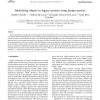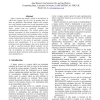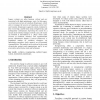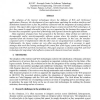115
click to vote
CASCON
1996
15 years 3 months ago
1996
A large portion of the software used in industry today is legacy software. Legacy systems often evolve into dicult to maintain systems whose original design has been lost or else ...
ECIS
2004
15 years 3 months ago
2004
Being hailed as possessing the ability to "drive effective business reengineering and management of core and support processes", it is not surprising that Enterprise Res...
132
click to vote
AINA
2008
IEEE
15 years 3 months ago
2008
IEEE
The evolution of any software product over its lifetime is unavoidable, caused both by bugs to be fixed and by new requirements appearing in the later stages of the product's...
139
click to vote
IWPC
1997
IEEE
15 years 6 months ago
1997
IEEE
Many organisations are migrating towards object-oriented technology. However, owing to the business value of legacy software, new object-oriented development has to be weighed aga...
107
click to vote
APSEC
1997
IEEE
15 years 6 months ago
1997
IEEE
The problems posed by mission-critical legacy systems - brittleness, inflexibility, isolation, non-extensibility, lack of openness etc. - are well known, but practical solutions h...
104
click to vote
CSMR
1998
IEEE
15 years 6 months ago
1998
IEEE
Legacy systems are usually critical to the business in which they operate, but the costs of running them are often not justifiable. Determining whether such systems are worth keep...
110
click to vote
COMPSAC
2002
IEEE
15 years 7 months ago
2002
IEEE
Legacy systems are often business critical and are associated with high maintenance costs. In this paper, we present an overview of a method, Renaissance, which aims to manage the...
102
click to vote
STEP
2003
IEEE
15 years 7 months ago
2003
IEEE
The adoption of the Internet technologies favors the diffusion of Web and Grid-based applications. However, the development of new applications exploiting the modern interfaces an...
121
click to vote
AGILEDC
2003
IEEE
15 years 7 months ago
2003
IEEE
The paper presents a sketch of a framework-based agile reengineering process, named PARFAIT1 , whose objective is to provide the users with evolved versions of legacy systems, as ...
139
click to vote
XPU
2004
Springer
15 years 7 months ago
2004
Springer
We describe how a small, successful, self-selected XP team approached a seemingly intractable problem with panache, flair and immodesty. We rewrote a legacy application by deliver...







